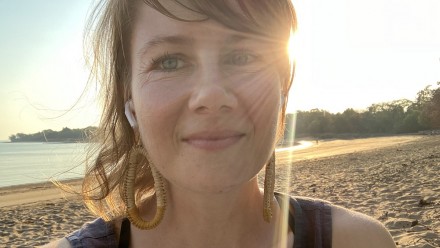Clinical Associate Professor Penelope Burns

Contacts
Penny Burns is a General Practitioner working in a hospital based general practice and in a GP respiratory clinic in Sydney. Her clinical title with ANU Medical School is with the Academic Unit of General Practice.
She has been working, researching, and teaching in the field of disasters now for over a decade. She is passionate about the need to integrate general practice in disaster management systems. Reflecting her interest, Penny has many roles related to disasters at local, state, national and international levels.
Penny has further research interests in human behaviour in road tunnel evacuations; management of animals in disasters; infection protection control in frontline healthcare workers; and a digital approach to prevention and treatment of PTSD prevention.
Penny also works with the ANU Institute for Climate, Energy and Disaster Solutions.
Specialisation
-
General Practice
Research interests
PhD at ANU: Contributions and Capabilities of General Practitioners in Disasters across the All Hazards All Agencies PPRR (Prevention Preparedness Response and Recovery) phases of disaster.
This PhD includes a comprehensive review of the health consequence of disasters from a primary healthcare perspective and a qualitative study using semi-structured interviews with a purposive sample of 38 GPs and 33 disaster managers who had experienced disasters in a professional capacity in Australia or NZ between 2009 and 2016 to explore their range of experiences, challenges, and roles. Questions on barriers and facilitators to GP involvement in the disaster were asked. Transcripts were analysed thematically.
The final aim is to propose and refine GP inclusion in disaster healthcare systems based on the research findings in order to improve the health care delivery to the thousands of Australians that are affected each year by disaster and to improve the safety, support and resilience of frontline GPs and their teams during these events.
Research has been disseminated through peer-reviewed papers and conference presentations.
ORCID: https://orcid.org/0000-0002-2484-043X
- Cuthbertson J, Stewart C, Lyon A, Burns P, Telepo T. Health Impacts of Volcanic Activity in Oceania. Prehosp Disaster Med. 2020:1-5. doi.org/10.1017/S1049023X2000093X
- Burns P, Douglas K, Hu W, Aitken P, Raphael B. General practitioners in the field: A qualitative study of general practitioners’ experiences in disaster healthcare. Australian Journal General Practice 2020; 49:3. doi: 10.31128/AJGP-08-19-5054
- Burns P, Manderson K. Building GP capacity in times of disaster. MJA Insight 27 January 2020 Issue 3.
- Burns P, Douglas K, Hu W. Primary care in disasters: opportunity to address a hidden burden of health care. MJA 2019 Apr; 210(7):297-299 doi:10.5694/mja2.50067
- Burns P, Douglas K, Hu W, Aitken P. The Future of Disaster Medicine is Based on Primay Care Involvement. Prehospital and Disaster Medicine 2019;34(Suppl. 1)s67 doi:10.1017/S1049023X1900147X
- Reay L, Burns P. The Role of Primary Health Networks and General Practitioners in Disasters: Nepean Blue Mountains Primary Health Network’s Preparedness Guide. Prehospital and Disaster Medicine 2019;34(Suppl. 1)s67 doi:10.1017/S1049023X19001481
- Burns P, Douglas K, Hu W, Aitken P. Patient Healthcare Following a Disaster: Guidelines for Family Doctors. Prehospital and Disaster Medicine 2019;34(Suppl. 1)s18 doi:10.1017/S1049023X19000530
- Ryan B, Burns P & Bhatia S. 2017 Integrating the Sendai Framework into Primary Health Networks: An Australian Experience Prehospital and Disaster Medicine 2017;32:2(S1) pp S205 doi:10.1017/S1049023X17005350
- Burns P, Douglas K, Hu W, Aitken P, Raphael B. 2017 When Disaster Strikes what is the Role of the Local Primary Healthcare Doctor? Prehospital and Disaster Medicine 2017;32:2(S1) pp S70 - S71. doi: 10.1017/S1049023X17001893
- Houssain A, Agho K, Page A & Burns P. 2016 Factors associated with childhood diarrhoea in four South Asia countries in press BMJ Open
- Taylor, M. & Burns, P. The preparedness and evacuation behavior of Australian pet owners. Asia Pacific Fire Magazine. 2016:59:93-97. Oct 2016. Available at: www.apfmag.com
- Burns P, Sutton P & Leggat P. 2016. Complex events. In: Fitzgerald G, Tarrant M, Aitken P. & Fredericksen M. (eds.) Disaster Health Management: A Primer for Students and Practitioners. First ed. New York London: Routledge.
- Reath JS, Burns P, Renshaw B, Brooker R, Abbott P, Kmet W, et al.. Evaluating a Health Care Partnership in Australia. International Journal of Integrated Care. 2015;15(5). DOI: http://doi.org/10.5334/ijic.2140
- Taylor M. Eustace G. Smith B. Thompson K. Westcott R. Burns P. (2015) Managing Animals in Disasters (MAiD): The experiences of emergency services personnel in supporting animals and their owners in disasters. Proceedings of the Bushfire and Natural Hazards CRC Research Forum. Wellington, New Zealand. (1 September 2014) http://www.bnhcrc.com.au/publications/biblio/bnh-1562
- Taylor M, Lynch E, Burns P & Eustace G. The preparedness and evacuation behaviour of pet owners in emergencies and natural disasters. AJEM. 2015;30(2):18-23. https://ajem.infoservices.com.au/items/AJEM-30-02
- Taylor M, McCarthy M, Burns P, Thompson K, Smith B & Eustace G. The challenges of managing animals and their owners in disasters: perspectives of Australian response organisations and stakeholders. AJEM. 2015;30(2):31-37. https://ajem.infoservices.com.au/items/AJEM-30-02
- Burns P, Aitken P, & Raphael B. Where are general practitioners when disaster strikes? MJA. 2015;202(7):356-358.
- Raphael B, & Burns P. The Sydney Siege: courage, compassion and connectedness. MJA. 2015;202(2):70-72.
- Issaka AI, Agho KE, Page AN, Burns PL, Stevens GJ & Dibley MJ. Determinants of early introduction of Solid, Semi-Solid or Soft Foods among Infants Aged 3-5 Months in Four Anglophone West African Countries. Nutrients. 2014;6:2602-2618.
- Issaka AI, Agho KE, Page AN, Burns PL, Stevens GJ & Dibley MJ. Factors Associated with Early Introduction of Formula and/or Solid, Semi-Solid or Soft Foods in Seven Francophone West African Countries. Nutrients. 2015;7:948-969.
- Issaka AI, Agho KE, Page AN, Burns PL, Stevens GJ & Dibley MJ. Comparisons of complementary feeding indicators among children aged 6-23 months in Anglophone and Francophone West African countries. Maternal and Child Nutrition. 2015;11(S1): 1-13.
- Issaka AI, Agho KE, Page AN, Burns PL, Stevens GJ & Dibley MJ. Determinants of sub-optimal complementary feeding practices among children aged 6-23 months in four Anglophone West African countries. Maternal and Child Nutrition. 2015;11(S1): 13-30.
- Issaka AI, Agho KE, Burns PL, Stevens GJ, Page AN, Dibley MJ. Determinants of sub-optimal complementary feeding practices among children aged 6-23 months in seven Francophone West African countries. Maternal and Child Nutrition. 2015; 11(S1): 31-52.
- Issaka AI, Agho KE, Burns PL, Stevens GJ, Page AN, Dibley MJ. The problem of sub-optimal complementary feeding practices in West Africa: What is the way forward?. Maternal and Child Nutrition. 2015; 11(S1): 53-60.
- Issaka AI, Agho KE, Burns PL, Page AN, Dibley MJ. Determinants of inadequate complementary feeding practices among children aged 6-23 months in Ghana. Public Health Nutrition. 2014; 18 (04): 669-678.
- Raphael B, & Burns P. Opinion: Children in disasters: the way forward. AJEM. 2014:29(1):6-7. Available at: http://www.em.gov.au/Publications/Australianjournalofemergencymanagement/Currentissue/Documents/AJEM_29_ONE.pdf
- Burns P, Stevens G, Sandy K, Dix A, Raphael B, & Allen B. Human Behaviour during an Evacuation Exercise in the Sydney Harbour Tunnel. AJEM. 2013;28(1):20-27.
- Hazelton K, Stevens G & Burns P. Mental health response for World Youth Day: the Sydney Experience. AJEM. 2011;26(4):48-53.
- Burns P & Raphael B. Information for General Practitioners involved with the NSW Bushfires. 2013. Available at: http://www.racgp.org.au/yourracgp/faculties/nswact/
- Burns P. Guidelines for GPs. General Practitioner Guide for Management of Mental Health and Related Consequences in the Victorian Bushfires. 2009. ACATLGN, ANU, Canberra, ACT, Australia.
- Raphael B & Burns P. The Carers Will Need Help Too. 2009. Australian Doctor. Available at: http://www.australiandoctor.com.au/opinions/guest-editorial/the-carers-will-need-help-too










